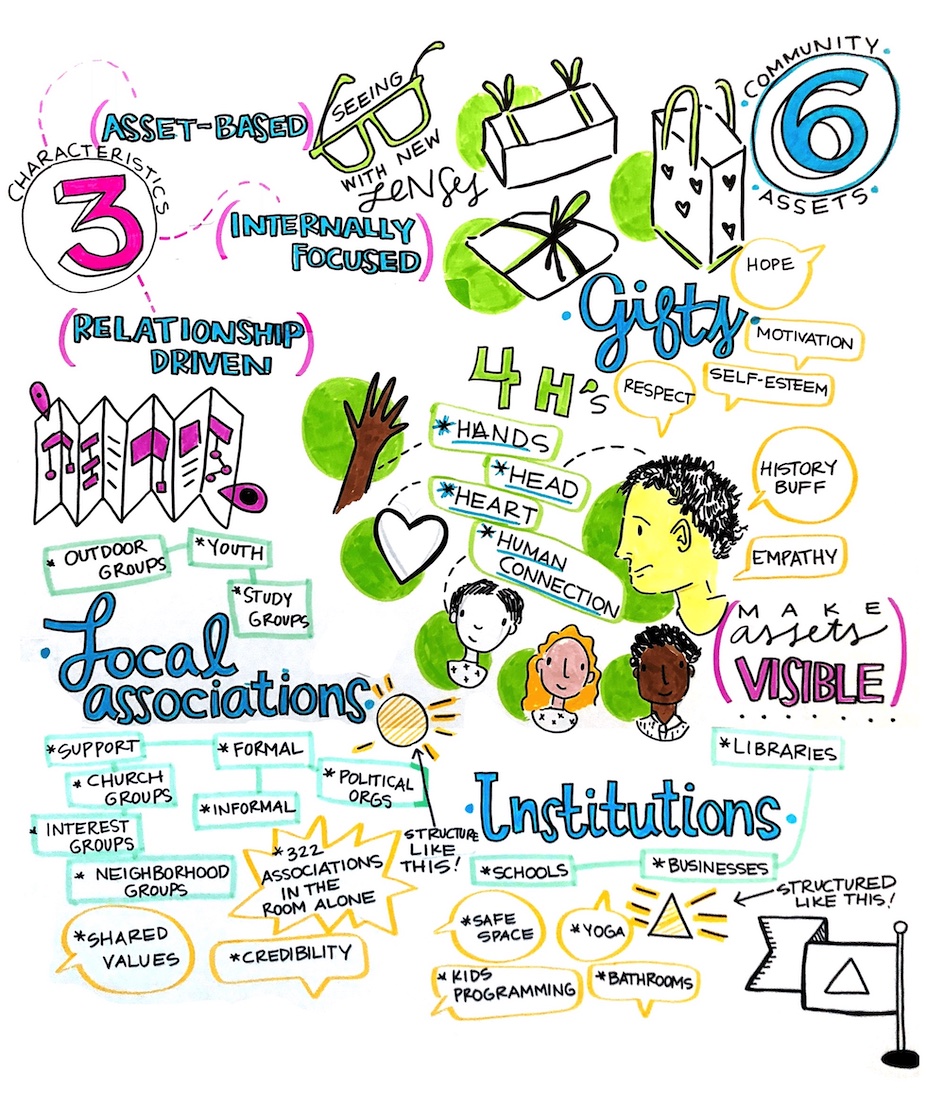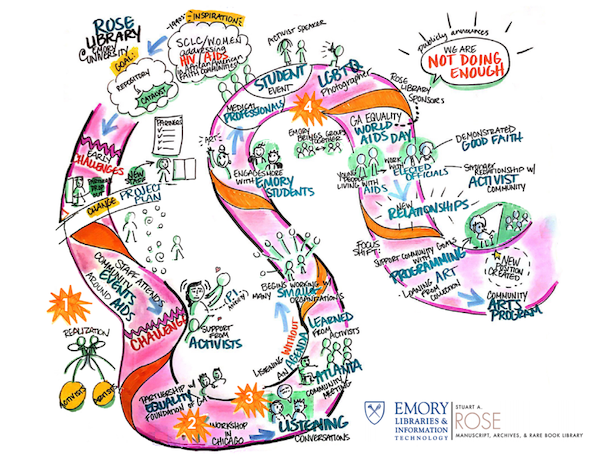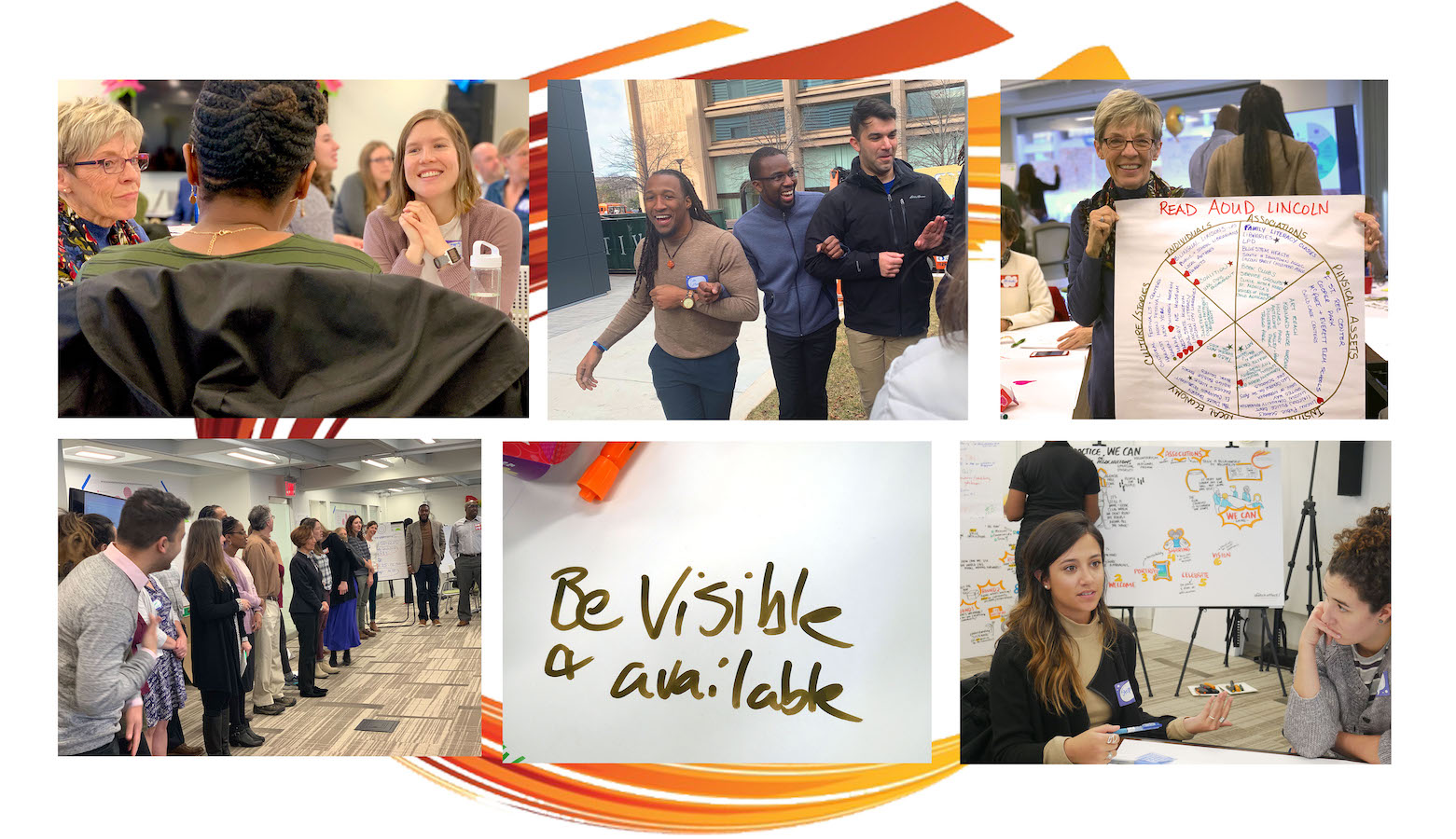
Nothing about us without us
So says Deb Wisniewski, consultant and evaluator on the Community Catalyst Initiative (CCI) grant from the Institute of Museum and Library Services (IMLS). The multi-year, multi-cohort grant is a partnership between the ABCD Institute and the Steans Center. Wisniewski's comment is central to the understanding of asset-based community development (ABCD) which emphasizes local assets as the primary building blocks of sustainable community development. The grant reflects an effort to shift the role of local institutions in supporting community-driven development to one where they become catalysts for community-based change led by community members.
The goal of CCI was to answer a fundamental question: How can libraries and museums catalyze positive, community-driven change? The first of the two rounds of the IMLS grants worked with a cohort of 24 libraries and museums across the country, each engaging with local communities through the lens of ABCD. From a nature center in rural Wisconsin and a library in west suburban Chicago, to a university school of social work and libraries serving communities in Baltimore, the libraries and museums explored how to engage more deeply with communities, recognize their assets, and practice “leading by stepping back." The IMLS initiative, now in its second cohort and grant cycle, will continue into September 2021.
CCI was designed to spark learning among grantees and formally trained leaders in the library and museum sector in social equity approaches to working with communities. For libraries and museums, the initiative was a journey through which they learned about what works – and what may not – as they transform how they collaborate with communities. ABCD Institute Faculty consultants worked closely with grantees who also could access a wide range of practical learning tools, including logic models, asset maps, power ladders, webinars, and other resources. Along the way, grantees addressed issues related to their readiness and capacity for community engagement, the importance of venturing out from “behind the desk" to build relationships in communities, and trying to build support within their institutions for ABCD as an approach.
For the ABCD Institute, the initiative builds on research published in 2005 by Susan Rans and Jody Kretzmann that identified the potential of libraries and museums to foster community engagement. Kretzmann co-founded the ABCD Institute with John McKnight at Northwestern University during the early 1990s. The publication, The Engaged Library: Chicago Stories of Community Building, explored how libraries are reaching out to communities. In 2016, IMLS released Strengthening Networks, Sparking Change: Museums and Libraries as Community Catalysts, a report that identified the potential of libraries and museums to productively engage communities. That same year, the ABCD Institute moved to the Steans Center at DePaul and established itself as a 501c3. In 2017, the Institute partnered with DePaul University to attain the first of two IMLS grants co-directed by Steans Center Executive Director Howard Rosing and the Center's Assistant Director for ABCD Partnerships Kim Hopes and led by ABCD Faculty Member April Doner.
“The IMLS project was an important opportunity for the ABCD institute to partner with DePaul to build on our previous experience working with libraries and museums," said Hopes; “it was a way for both the Institute and the University to support the creation of tools that can be applied by many neighborhood-based institutions and to learn from that process." ABCD co-founder John McKnight points out how the grant is consistent with the ABCD Institute's work. “The gap between institutions and local communities is pervasive and is faced by almost every kind of institution," he said. “To put it into perspective, this initiative is our effort to join these institutions in creating new, innovative, and effective relationships with citizens."
Reflecting on the relationship-building process, Marvin Carr, Senior Evaluation Advisor with IMLS, points out that CCI builds on the critically important community-building role of libraries and museums. “Most Americans live within ten miles of a library or museum. There's also a belief among people who work at these institutions and community members that they can serve people of all different backgrounds," Carr said.
In our culture, we often see a construct of programs supported by funders and carried out by grantees. What's needed are activities and relationships. This initiative is about how libraries and museums can engage with communities in a more meaningful way
For ABCD faculty and grantees involved in the CCI, the starting point for community engagement was to ask the questions: What are communities already doing for themselves and by themselves? What are the existing gifts and talents in the grantees' own communities? For the grantees, it became apparent during the project that their experience answering these questions was not going to be tied to a process with a predictable path or conclusion. As a result, grantees had the flexibility to explore and discover how to engage with communities and to encourage a wide range of residents to share assets and talents that they contribute to their community. Mirroring this sentiment, ABCD Institute Board Chair Dan Duncan noted: “In our culture, we often see a construct of programs supported by funders and carried out by grantees. What's needed are activities and relationships. This initiative is about how libraries and museums can engage with communities in a more meaningful way."
For the Steans Center, the CCI shines light on potential avenues for community engagement among libraries and museums in Chicagoland. “We are learning from this Initiative about how we can engage more deeply and build partnerships with local libraries and museums," said Howard Rosing. That learning process took place primarily through the relationship between ABCD Institute faculty consultants and IMLS grantees across the U.S. In addition to in-person trainings and workshops that brought grantees together in Chicago, Oak Park, Illinois, and Washington D.C., the project's consultants regularly connected with grantees both virtually and through site visits to grantees' communities.
 Community Catalyst Initiative Grantees Meeting, Oak Park Library, September 2019
Community Catalyst Initiative Grantees Meeting, Oak Park Library, September 2019ABCD Institute Faculty Consultants
Deb Wisniewski worked with the Riveredge Nature Center in Saukville, WI and other grantees. She said that the flexibility of the CCI was especially important. “Grantees learned how to be intentional without having pre-defined outcomes," Wisniewski said. “They figured out ways to modify what their institutions do in a way that supports the involvement of community residents. It's about asking questions and building relationships together." Wisniewski added: “Institutions in general have a tendency to be needs-based and focused. When you do that you can miss out on the gifts, talents, and assets of communities – and the leadership of community residents."
Institutions in general have a tendency to be needs-based and focused. When you do that you can miss out on the gifts, talents, and assets of communities – and the leadership of community residents.
Consultant Ron Dwyer-Voss, who worked as a community organizer in Chicago during the late 1980s and early 1990s, described how a collaboration between the Oak Park Public Library in suburban Chicago, the Oak Park-based Equity Team, Inc. (E Team) and Triton College came together through this Initiative. “With all that was going on in Oak Park schools with race issues, there was a need for a place to be able to talk about that." The library provided that space – as well as a regular pop-up barber shop where young people could meet and talk. “This process changed how the library saw itself as not just a provider of goods, but as an actual dynamic engager of the citizenry," Dwyer-Voss added.
For consultant Joe Erpenbeck, the key was for grantees to find an issue that was important to their community - a process that is not about how an institution defines the issues but how it meets the community where it's at. “What we're learning is that a year is a short time. Working with the community takes time and support, and libraries and museums must be a committed champion. The asset-based approach is a way to build and embrace communities," noted Erpenbeck. Reflecting on this shifting mindset, he recalled asking a grantee 'What do you hope comes from this project?' and how the grantee responded several times "I hope it's not just about transactions, but builds on community assets."
Supporting this cultural shift in how institutions engage with their communities is central to the work of DeAmon Harges who supports grantees as part of the second cohort IMLS grant. Harges said that it's not just community members who have assets – it is the institutions in the community that they share, like public libraries. “These spaces hold the joy of culture," he said. “We have to make sure that people in the community are part of that culture and have access to it." He added that the impact of ABCD is not limited to certain institutions or communities. “Even big systems can do this work."
IMLS Grantees
In Baltimore, Enoch Pratt Free Library partnered with University of Maryland School of Social Work to engage interns in promoting the library as a space to welcome members of the community to address an array of issues including poverty and homelessness. Lane Victorson, Clinical Faculty Field Instructor at the School of Social Work points to the change in how students view the community. “This project interrupts the bias or belief that the only approach to working on urban issues is a deficit model," he said. “We try to turn that around because people have strengths, gifts, and talents. The library feels like a free, nonjudgmental space – a place to do building and connecting." Through the project, 30 university students were involved in asset-mapping activities and the development of mutual support groups at the libraries that brought people from the community together. “Our students learned a new way to partner with the community – and how residents can come together in a space where their talents are recognized and they can talk authentically about power, race, economics and other issues impacting their lives," Victorson said.
 Journey Map, Rose Library, Emory University
Journey Map, Rose Library, Emory University In Atlanta, the Stuart A. Rose Library at Emory University created a new forum for community engagement – a community advisory board that met monthly. The board was an avenue for community members to address a range of issues, including a healthcare system that often pits advocates against one another. Courtney Chartier., Head of Research at the library, says that the initiative brought together “people who are working on these issues to share their view of the current landscape and history of HIV/AIDS in Atlanta." She stated that more archival institutions could benefit from the ABCD approach and grant-funded projects like this one. In this case, the library was able to serve as a convener and community advisory board members were compensated for their time. Courtier added that the ABCD community of practice coordinated by Lead Consultant April Doner helped grantees learn what other grantees were doing across the country.
In the rural community of Saukville, WI, the Riveredge Nature Center – the oldest nature center in the state – focuses on the water quality of the Milwaukee River. “When we saw this opportunity of the Community Catalyst Initiative, it just made sense, because we cannot do this work without engaging citizens," said Cassie Bauer, Family & Community Programs Manager at the Center. “You can't just send out surveys to gauge what's going on in the community – you have to reach out to people." The Center reached out to community members by “just being a fly on the wall," she said. “If municipal leaders were holding a meeting, we'd ask to be invited." The Center, which is housed on 380 acres, started holding gatherings outdoors which led to more gatherings. Staff learned from a resident in the community that a woman who lives in the area found softshell turtle eggs nesting in her yard. She raised them until they hatched. A turtle-release event was subsequently sponsored by the Riveredge Nature Center including participants from three generations. “This person was doing something inspiring, and then invited people to come out and hand-release these turtles," Bauer said. “This was a wonderful moment that showed good things are happening here."
 Community Catalyst Initiative Grantee Gatherings
Community Catalyst Initiative Grantee Gatherings ABCD Faculty Member April Doner, who coordinated the bulk of the activities on the grant as lead consultant, points to an alternative to the intense divisiveness that has been part of the daily lives of many in the U.S. and elsewhere. Doner says that the asset-based approach – including the role of institutions like libraries and museums – emphasizes the inclusion of all community residents. “This initiative reflects what asset-based community development is about – regular, ordinary people getting together to combine passions and resources," Doner said. “It's about how people exercise their agency and determine what happens in their communities. That can appeal to people with different political persuasions. Yes, it's possible to build power and shift dynamics in a community without polarizing people. And libraries and museums can play a positive role in making that happen."
Rosing summed it up. “Communities that know themselves, that know their assets, especially the gifts and talents of individuals and the neighborhood associations that they create, build powerful networks for promoting change. With the CCI grant, we now know more about how libraries and museums can play an important part in centering community members in civic processes that positively impact peoples' daily lives. What could be more important right now?"
For more information: IMLS Community Catalyst Initiative and ABCD Institute - Museums and Libraries